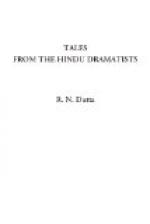He performs various feats at Lanka and returns to Rama whose hosts now advance towards Lanka.
Vibhishana, the brother of Ravana, expostulates with his royal brother, but in vain. Consequently he deserts the king and goes over to Rama.
The Monkeys advance further towards Lanka.
A bridge is built over the sea.
The troops cross over it.
Where first the Monkey bands advance, they view a watery belt smoothly circling round the shore: the following troops plough their way through the thick mire with labour; the chief who leads the rear, filled with wonder, exclaims, “Here is Ocean.”
Rama now sends Angada, the son of Bali, to persuade Ravana to relinquish Sita peaceably. Angada has some feeling of aversion to Rama, who killed his father, but thinks he shall best fulfil his father’s wishes by promoting the war between Ravana and Rama; he therefore goes to Ravana and defies him in very haughty terms.
Ravana says:—
“Indra, the king of the gods, weaves garlands for me; the thousand-rayed or the Sun keeps watch at my gate; above my head Chandra or the Moon uprears the umbrella of dominion; the wind’s and the ocean’s monarchs are my slaves; and for my board the fiery godhead toils. Knowest thou not this, and canst thou stoop to praise the son of Raghu, whose frail mortal body is but a meal to any of my households?”
Angada laughs and observes:—“Is this thy wisdom, Ravana? Infirm of judgement dost thou deem of Rama thus—a mortal man? Then Ganga merely flows a watery stream; the elephants that bear the skies, and Indra’s steed, are brutal forms; the charms of Rembha are the fleeting beauties of earth’s weak daughters, and the golden age, a term of years. Love is a petty archer; the mighty Hanuman, in thy proud discernment, is an ape.”
Angada, having in vain endeavoured to persuade Ravana to restore Sita, leaves him to expect the immediate advance of the Monkey host.
Virupaksha and Mahodara, two of Ravana’s ministers utter a string of moral and political sentences.
Ravana is not to be persuaded, but goes to Sita to try the effect of his personal solicitations—first endeavouring to deceive her by two fictitious heads, made to assume the likenesses of Rama and Lakshmana. Sita’s lamentations are stopped by a heavenly monitor, who tells her that the heads are the work of magic and they instantly disappear. Ravana then vaunts his prowess in war and love, and approaches Sita to embrace her. She exclaims “Forbear, forbear! proud fiend, the jetty arms of my loved lord, or thy relentless sword, alone shall touch my neck.”
Thus repulsed, Ravana withdraws, and presently reappears as Rama, with his own ten heads in his hands. Sita, thinking him to be what he appears, is about to embrace him, when the secret virtue of her character as a faithful wife detects the imposition, and reveals the truth to her. Ravana, baffled and mortified, is compelled to relinquish his design. Sita’s apprehensions, lest she should be again beguiled, are allayed by a voice from heaven, which announces that she will not see the real Rama until he has beheld Mandodari kiss the dead body of her husband Ravana.




